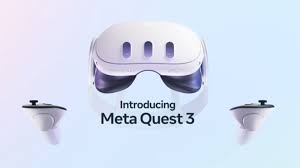Mark Zuckerberg, CEO of Meta Platforms, made an exciting statement on Instagram when he showed off the Quest 3 VR headset, which is Meta’s next-generation mixed reality device.
Meta is doing this to get ready for possible competition from Apple, which is said to be getting into the mixed reality business.

The Quest 3 starts at $499, and its thinner design and cutting-edge colour mixed reality technology, which combines parts of augmented reality (AR) and virtual reality (VR), promise to improve the user experience. Zuckerberg posted on Instagram about the news before Meta’s annual game conference.
Read also: Sony bets big on its next VR headset
Meta also stated that the price of its existing Quest 2 headsets would go down, making them more affordable for a wider range of people. On June 4, the 128GB version of the Quest 2 will cost $299.99, which is $100 less than before.
The 256GB version will cost $349.99, which is $80 less than before. Along with lowering the price, Meta has improved Quest 2’s speed so that users can have a smoother and more immersive experience.
Quest 3 VR’s notable improvements
The Quest 3’s Qualcomm chipset doubles graphics performance over the Quest 2. Zuckerberg announced that Meta’s annual AR/VR conference on September 27th will reveal more about Quest 3’s fall arrival. Meta’s clever scheduling builds enthusiasm for its latest offering.

It’s interesting that Zuckerberg’s news comes just days before Apple’s expected unveiling of its first mixed reality device. Bloomberg says that Apple’s high-end mixed reality gadget will probably cost around $3,000. With Apple’s entry into the market, there will be more competition in the mixed reality area.
IDC, a market research company, predicts that nearly 80% of the 8.8 million VR headsets that will be sold in 2022 will be Meta’s Quest 2 and Quest Pro models. The closest rival, the Pico device from Chinese company ByteDance, had a 10% market share. This amazing market share shows Meta’s strong position in the industry.
Meta is the market leader, but it has had trouble getting customers outside of the gaming business and making the metaverse it promised a reality. A study by Reuters found that eight of the top ten most downloaded apps from Meta’s Quest store are games. This shows that even though Meta is trying to find more uses for virtual reality, gaming is still the most popular one.
Also, the general market for AR/VR headsets fell by 54.4% from the same time last year to the first quarter of this year. In Meta’s Reality Labs parts, which include sales of headsets, sales dropped by 50% compared to the year before. These numbers show that Meta needs to overcome problems and get people to buy its goods again.
Read also: MTN Becomes Africa’s First Metaverse Landlord, Buys 144 Plots of Virtual Land
To deal with these problems, Meta has been looking hard into other areas. For example, the company has gotten into the exercise industry by advertising its products as tools for working out. Zuckerberg has shared videos of himself using Meta devices while doing physical sports like fencing and mixed martial arts. Also, Meta was able to buy the company that made the VR fitness app Supernatural, which shows how serious it is about getting into the fitness business.

Meta has also added work tools to the Quest headsets, turning them into virtual offices to get more people to use them. Meta has made it possible for popular apps like Teams and Outlook to run on Quest devices by working with Microsoft in an important way. Meta wants to make its headsets important tools for remote work and collaboration by adding these well-known productivity tools.
